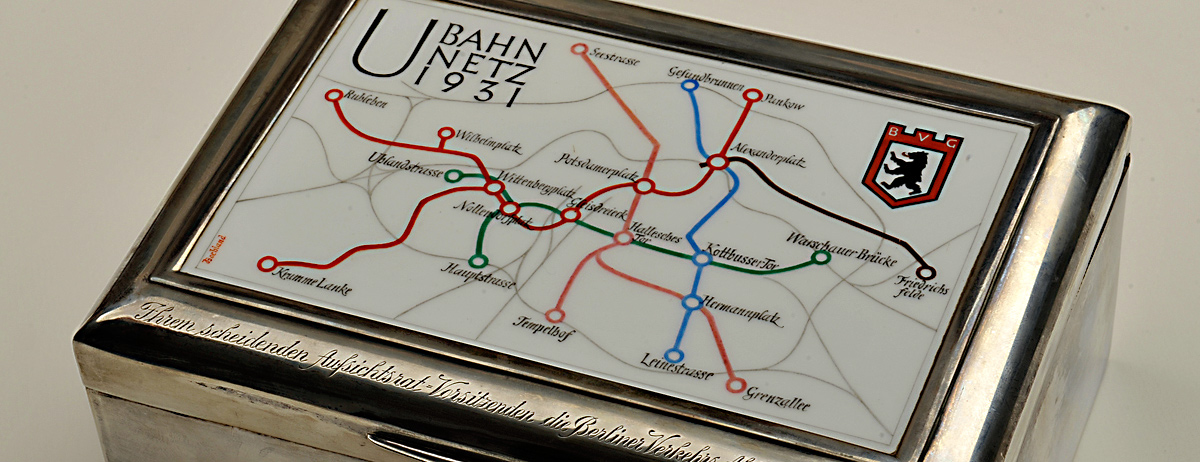More than just paper
One of the aims of the Ernst Reuter Archives Foundation is to continuously supplement Ernst Reuter’s legacy in the Berlin Landesarchiv through donations, acquisitions, and research in foreign archives. Here we present a few finds from the archive’s holdings.
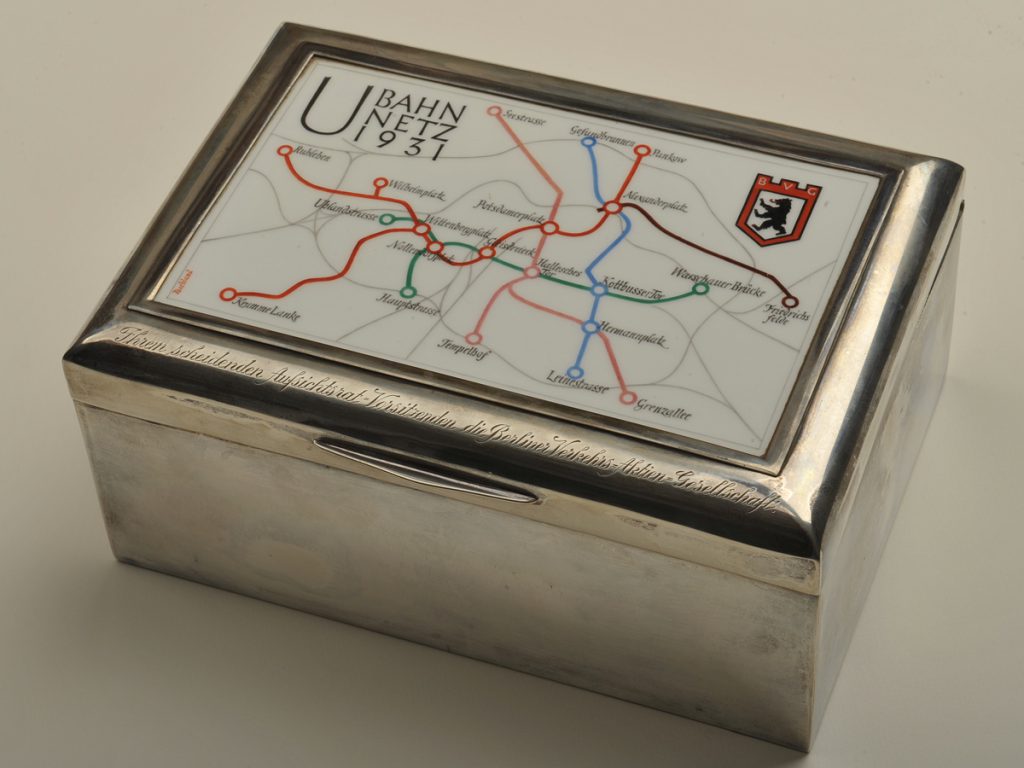
Image credits »© Thomas Platow, Landesarchiv Berlin.
“To the outgoing chairman of the supervisory board”. A farewell gift to the founder of BVG
This silver cigar box from the workshop of the former imperial court jeweler Johann Heinrich Werner was presented to Ernst Reuter in 1931 to mark his retirement from the Board of Directors of the BVG (the Berliner Verkehrsbetriebe, Berlin’s main public transport company). For five years prior to this, Reuter had been a city councilor for transport in Berlin, and had been particularly committed to the municipalization of the numerous private transport companies in the metropolis and the creation of an extensive system of local public transport. His efforts culminated in the founding of the Berliner Verkehrs AG (BVG) in 1929, which was at the time the largest local public transport company in the world. Reuter also promoted the expansion of the U-Bahn network: before the First World War it comprised 37 kilometers of track, and by the end of his time in office it had grown to 76 kilometers. The porcelain panel of the cigar box, designed by Johannes Boehland, depicts the U-Bahn network in 1931.

Image credits »© Thomas Platow, Landesarchiv Berlin.
“Dad’s America suitcase”, and Ernst Reuter’s trip to the USA in 1929
In May 1929, in his function as city councilor for transport in Berlin, Ernst Reuter set off for a six-week trip through the USA together with head of municipal planning Martin Wagner and five delegates. One of the aims of the visit was to gain an understanding of American transport system and city planning, as Berlin was facing challenges in both of these areas at the time. During his trip, Reuter carried with him a large suitcase that is now held by the Foundation. It bears his initials and could also be used as a wardrobe thanks to a pull-out bar. Upon his return, Reuter’s suitcase contained not only numerous notes, detailing both his fascination with and criticism of America’s cities, but also a half-hour documentary film made by Reuter himself, entitled “American Traffic. Impressions of a Study Trip”. For more information on the Berlin magistrate’s visits to the USA in 1929, see also the Ernst Reuter booklet Reisen in die Zukunft (Journeys into the Future), written by Michael C. Bienert.
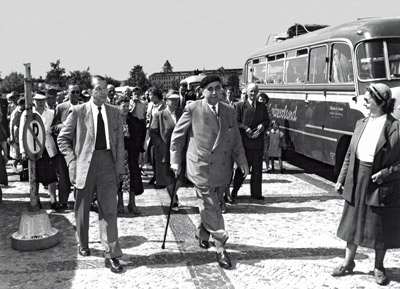
Image credits »© Landesarchiv Berlin, Rep. F, 290, Nr. 0026923 (Gert Schütz).
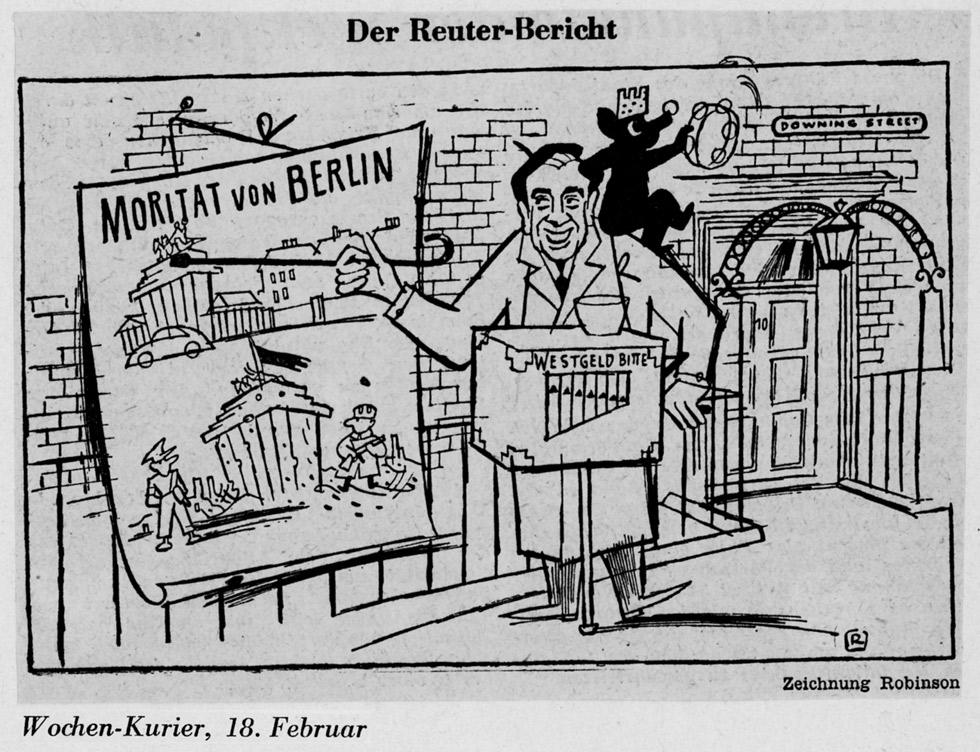
Image credits »© Stiftung Ernst-Reuter-Archiv.
Two of Reuter’s trademarks – and a birthday present
The stick and the beret: these were the unmistakable trademarks of Ernst Reuter in the post-war period. They accompanied him virtually everywhere, and they were not missing when Reuter embarked upon a city tour through West Berlin on 9 August 1953, which had been organized for East Berliners (see photo). Of course, the characteristic effect of these accessories did not escape caricaturists, as demonstrated by the albums that were presented to Reuter by the staff of the press office for his birthday each year from 1949; they contained collections of caricatures from the western press and that of the GDR, usually depicting Reuter with his beret and walking stick. In the first album, which was entitled “Dem Oberbürgermeister eine ‘süsse’ Pille zum 60-sten” (“A ‘sweet’ pill for the Mayor’s 60th”) and contained exclusively extracts from the GDR press, Reuter is frequently shown wearing a fez – a denigrating allusion to his time in Turkey. Alongside these volumes of caricatures, the collections of the Berlin Landesarchiv and the Ernst Reuter Archives Foundation include three walking sticks and seven berets that belonged to the former Governing Mayor.
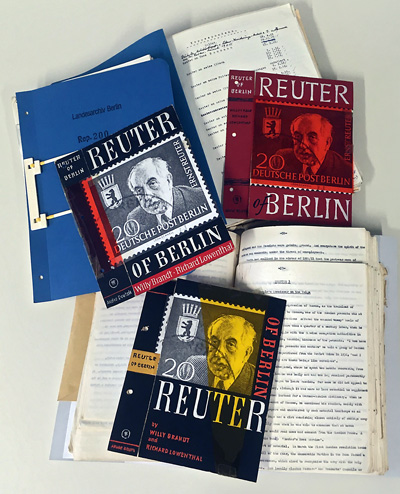
Image credits »© Stiftung Ernst-Reuter-Archiv.
A book is born – The documentation of the “Ernst Reuter” biography by Richard Löwenthal und Willy Brandt
Shortly after Ernst Reuter’s death, his party friends Willy Brandt (1913–1992) and Richard Löwenthal (1908–1991) began to gather materials for a biography of the politician. Together with several colleagues and supported by Reuter’s widow, they compiled an extensive collection of sources, conducted interviews with contemporaries, and made countless transcripts of letters, newspaper articles, and speeches. These materials, as well as documentation of the work on “Ernst Reuter. Ein Leben für die Freiheit” (“Ernst Reuter. A Life for Freedom”) are now held in the Berlin Landesarchiv. Comprising correspondence between the authors, chapter corrections, and cover drafts, this documentation offers an exciting insight into the process of creating the biography, which was published in 1957.
↑ Image credits Headerimage© Thomas Platow, Landesarchiv Berlin.

